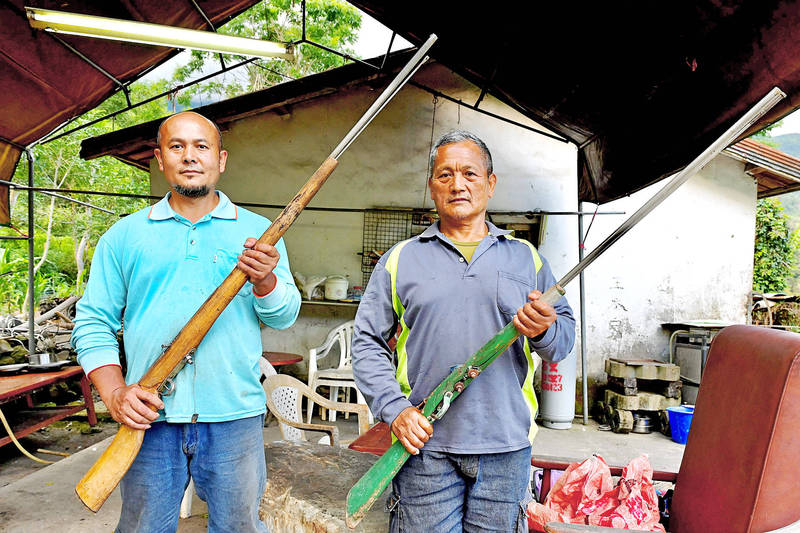《TAIPEI TIMES》 President pardons Bunun hunter

Tama Talum, right, and his neighbor pose for a photograph at a village in Taitung County on May 1 last year. Photo: Sam Yeh, AFP
HEALING TENSION: Tama Talum welcomed the pardon, while the Presidential Office said that it carried special weight amid efforts for transitional justice for Aborigines
By Jake Chung / Staff writer, with CNA
President Tsai Ing-wen (蔡英文) yesterday pardoned a Bunun hunter charged in 2013 with killing protected animals, on the first anniversary of her second presidential term.
The pardon of Tama Talum, convicted in 2015 for killing a Reeves’ muntjac and a Formosan serow with a modified shotgun, is the first pardon of Tsai’s two terms since 2016 and the seventh since the enactment of the Constitution on Dec. 25, 1947.
Talum was sentenced to three-and-a-half years in prison for possessing an illegal weapon and hunting protected species. He appealed, and in 2017, the Supreme Court suspended the hearing, but asked the Council of Grand Justices to review hunting regulations under the Controlling Guns, Ammunition and Knives Act (槍砲彈藥刀械管制條例) and the Wildlife Conservation Act (野生動物保育法).
The Council of Grand Justices on May 7 ruled in Constitutional Interpretation No. 803 that some restrictions on Aborigines were unconstitutional, but stopped short of supporting a total overhaul of the regulations.
The Supreme Court yesterday said that although Talum was pardoned from serving his sentence, it would need to follow procedure until the case is closed, as verdicts from the lower appellate courts still stand.
Presidential Office spokesperson Kolas Yotaka, an Amis, said the decision carried significant weight, especially amid the government’s efforts to promote historical and transitional justice for Aborigines.
The Constitution clearly supports the values of a multiethnic and multicultural society, guaranteeing Aborigines the right to express their culture in the form of hunting, she said.
“The people share their living space with nature. It is part of Aboriginal culture. They live together, they live off each other,” Kolas said, adding that hunting is a natural part of the lives of Aborigines.
Although Talum had contravened certain laws, his actions were within the defined parameters of Aboriginal culture, as stated in Constitutional Interpretation No. 803, and he should be pardoned to show that the government respects Aboriginal culture, she said.
Talum said that he had not yet heard the news of the pardon from his lawyer, adding that he would be happy if it is true.
He said he would not go out of his way to mention it to his 99-year-old mother, for whom he had said he hunted the birds in 2013, given her advanced age and poor memory.
Another hunter Pan Chih-chiang (潘志強), a Puyuma who was sentenced on similar charges and among those petitioning for a constitutional interpretation on hunting, said he was happy to hear of Tsai’s decision, adding that the pardon would help dissolve ethnic tension and confrontation.
Pan in 2014 was sentenced to six months in prison, or a fine of NT$180,000, for killing two Reeves’ muntjacs. He chose to pay the fine.
The Environment and Animal Society of Taiwan said that the pardon was mostly issued due to Talum’s aging mother, adding that Aboriginal communities must step up self-policing of hunting.
There are more than 700 Aboriginal communities nationwide, and if wildlife hunting is not monitored and regulated with a total cap, more wild animals would need legal protection due to overhunting, the society said.
新聞來源:TAIPEI TIMES
















